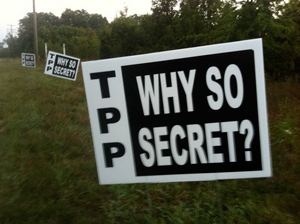
As the future of the proposed Canada-European Union Trade Agreement becomes increasingly uncertain -- the EU has been unwilling to compromise on the remaining contentious issues leaving the Canadian government with a deal that offers limited benefits and significant costs -- the Trans-Pacific Partnership Agreement (TPP) is likely to emerge as the government's new top trade priority.
The TPP has rapidly become of the world's most significant trade negotiations, with participants that include the United States, Australia, Mexico, Malaysia, New Zealand, Vietnam, Japan, and Canada. There is a veil of secrecy associated with the TPP, however, as participants are required to sign a confidentiality agreement as a condition of entry into the talks. Despite those efforts, there have been occasional leaks of draft text that indicate the deal could require major changes to Canadian rules on investment, intellectual property, cultural protection, procurement, and agriculture.
The Canadian government has adopted several measures to guard against leaks by departmental officials. According to documents obtained under the Access to Information Act, a Nov. 2012 email to government officials noted that their access to TPP texts was conditioned on "Secret" level clearance, an acknowledgement that all texts are watermarked and can be traced back to the source, and confirmation that no sharing within government is permitted without prior approval.
Secret insider group
While the government tries to stop potential leaks, the newly obtained government documents reveal that the Department of Foreign Affairs and International Trade has established a secret insider group with some companies and industry associations granted access to consultations as well as opportunities to learn more about the agreement and Canada's negotiating position.
Those documents indicate that the first secret industry consultation occurred weeks before Canada was formally included in the TPP negotiations in a Nov. 2012 consultation with telecommunications providers. All participants were required to sign non-disclosure agreements.
Soon after, the circle of insiders expanded with the formation of a TPP Consultation Group created as part of the trade talks in New Zealand in Dec. 2012. Representatives from groups and companies such as Bombardier, the Canadian Manufactures and Exporters, Canadian Agri-Food Trade Alliance, and the Canadian Steel Producers Association all signed a confidentiality and non-disclosure agreement that granted access to "certain sensitive information of the Department concerning or related to the TPP negotiations."
We've seen this before
This is not the first time DFAIT has tried to establish a secret insiders group that is granted preferential access to proposed treaty information not otherwise available to the public. During the Anti-Counterfeiting Trade Agreement negotiations, the department planned for a similar insider group -- called a Trade Advisory Group -- that initially included representatives from the music, movie, software, and pharmaceutical industries. The plan was scuttled only after the department's intention became public.
While the need for business insight as part of trade talks is understandable, the two-tier approach raises serious concerns about the lack of transparency associated with Canada's global trade strategy. As the Canada-EU Trade Agreement has begun to founder, Canadian officials have become increasingly tight-lipped about the specific concerns associated with the agreement. By contrast, European officials regularly update both elected officials and the general public. In fact, Europe has become the primary source for information about where Canada stands in the negotiations.
The creation of a secret TPP insider group suggests that the government is shying away from public consultation and scrutiny of an agreement that could have a transformative effect on dozens of sectors. With TPP negotiations set resume in Lima, Peru in less than two weeks, Canada should be increasing efforts to gain public confidence in the talks by adopting a more transparent approach. ![]()
Read more: Politics















Tyee Commenting Guidelines
Comments that violate guidelines risk being deleted, and violations may result in a temporary or permanent user ban. Maintain the spirit of good conversation to stay in the discussion.
*Please note The Tyee is not a forum for spreading misinformation about COVID-19, denying its existence or minimizing its risk to public health.
Do:
Do not: